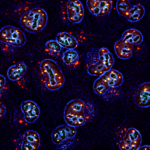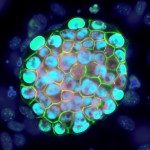Lien vers Pubmed [PMID] – 16326389
Dev. Cell 2005 Dec;9(6):769-79
Covalent modification by SUMO regulates a wide range of cellular processes, including transcription, cell cycle, and chromatin dynamics. To address the biological function of the SUMO pathway in mammals, we generated mice deficient for the SUMO E2-conjugating enzyme Ubc9. Ubc9-deficient embryos die at the early postimplantation stage. In culture, Ubc9 mutant blastocysts are viable, but fail to expand after 2 days and show apoptosis of the inner cell mass. Loss of Ubc9 leads to major chromosome condensation and segregation defects. Ubc9-deficient cells also show severe defects in nuclear organization, including nuclear envelope dysmorphy and disruption of nucleoli and PML nuclear bodies. Moreover, RanGAP1 fails to accumulate at the nuclear pore complex in mutant cells that show a collapse in Ran distribution. Together, these findings reveal a major role for Ubc9, and, by implication, for the SUMO pathway, in nuclear architecture and function, chromosome segregation, and embryonic viability in mammals.



